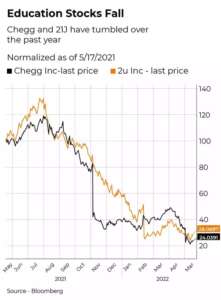Arjun Mohan, the CEO of Byjus stepped down on April 15 and this led to Byju Raveendran taking over the organization who is also the founder. The CEO’s exit occurs a mere 10 months following his appointment to oversee Byju’s international operations.
Reason for CEO resignment from Byjus
 Arjun Mohan has confirmed to Moneycontrol that he will be resigning to explore new opportunities, citing a decrease in business activity. Byju Raveendran will assume greater responsibility for day-to-day operations, a move CEO Mohan believes will boost morale. Raveendran is making a comeback to the leadership role after a four-year hiatus.
Arjun Mohan has confirmed to Moneycontrol that he will be resigning to explore new opportunities, citing a decrease in business activity. Byju Raveendran will assume greater responsibility for day-to-day operations, a move CEO Mohan believes will boost morale. Raveendran is making a comeback to the leadership role after a four-year hiatus.
According to a source familiar with the situation, Mohan had aspirations of securing the top position at Aakash, a position ultimately filled by the former Pearson India MD last week. With diminished business prospects at Byju’s and no opportunity at Aakash, Mohan has opted to explore alternative opportunities within the Edtech sector.
After the departure of its India CEO Mrinal Mohit, a founding member and former student of Raveendran, Mohan assumed responsibility and spearheaded the business restructuring at Byju’s. CEO, Mohan, previously Byju’s Chief Business Officer, departed the company in 2020 to take on the role of CEO at Ronnie Screwvala’s upskilling unicorn upGrad. He later returned to Byju’s in July to lead its international operations, although the company had not made an official announcement at that time.
Indeed, a key responsibility for Mohan was to oversee the restructuring and downsizing of the company. He spearheaded a significant restructuring initiative, resulting in the reduction of 4,000 to 5,000 jobs at Byju’s.
Raveendran’s take on administering the company
 According to sources, Founder Byju Raveendran will resume responsibility for the day-to-day operations of the company’s India business, housed under Think & Learn, after an absence of almost four years. The latest development, indicating a worsening situation at the company, coincides with Raveendran facing numerous challenges that have emerged over the past year.
According to sources, Founder Byju Raveendran will resume responsibility for the day-to-day operations of the company’s India business, housed under Think & Learn, after an absence of almost four years. The latest development, indicating a worsening situation at the company, coincides with Raveendran facing numerous challenges that have emerged over the past year.
Byju’s has announced a strategic reorganization to streamline its operations and position the company for long-term success. As part of this initiative, BYJU’S will consolidate its businesses into three divisions: The Learning App, Online Classes and Tuition Centers, and Test-prep, according to the official press release.
This new organizational structure aims to enhance agility, cost-effectiveness, and the ability to seize market opportunities within each vertical. Additionally, each of these units will be led by separate leaders who will autonomously oversee the businesses’ sustainable growth and profitability, as outlined in the release.
Future of BYJUS
 Byju Raveendran, founder and group CEO of Byju’s, described the reorganization as the beginning of BYJU’S 3.0, emphasizing a more streamlined and adaptable organization poised to respond swiftly to shifting market dynamics, particularly in the realm of hyper-personalized education.
Byju Raveendran, founder and group CEO of Byju’s, described the reorganization as the beginning of BYJU’S 3.0, emphasizing a more streamlined and adaptable organization poised to respond swiftly to shifting market dynamics, particularly in the realm of hyper-personalized education.
Furthermore, Byju’s has announced the successful approval of the vote for an increase in authorized share capital, which was proposed through a postal ballot and an Extraordinary General Meeting (EGM) held on March 29, 2024. According to the company’s official announcement, 55% of the total votes polled supported the proposal. An independent third party has meticulously scrutinized the voting process, which included both the EGM and the postal ballot that concluded on April 6, 2024.
The endorsement of the EGM proposals clears the path for Think & Learn Private Limited, the parent company of BYJU’S, to issue new shares and finalize the rights issue intended to address the liquidity challenges, including outstanding salaries, regulatory obligations, and payments to vendors. These delays were attributed to the irrational opposition from four foreign shareholders, who opted for legal action rather than constructive dialogue, as stated in the company’s release.
The anticipated outcome of this new structure is to empower each division to operate with increased agility, cost-effectiveness, and readiness to seize market opportunities.










